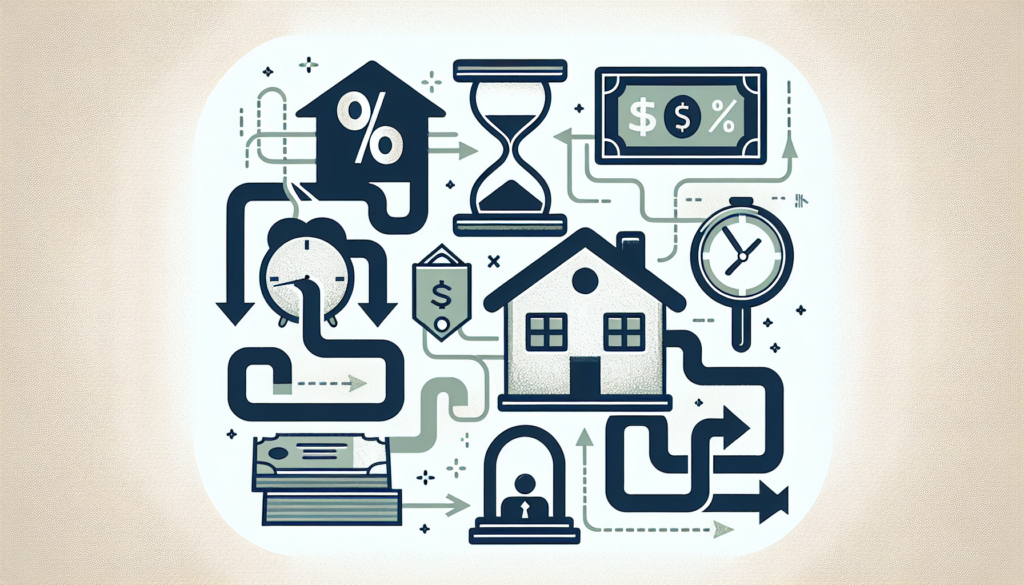Imagine you’re on the path to buying your dream home. You’ve done the research, found the perfect property, and now it’s time to navigate the world of property financing terms and conditions. Don’t worry, we’re here to break it down for you in a way that is easy to understand and friendly. In this article, we’ll guide you through the essential terms and conditions you need to know to make the best decisions for your property financing journey. So grab a cup of coffee, sit back, and let’s dive into the world of property financing terms and conditions together.
I. Loan Types
When it comes to financing your property purchase, there are several types of loans to consider. Understanding the differences between these loan types can help you choose the one that best suits your needs and financial situation.
A. Conventional Loans
Conventional loans are the most common type of mortgage loan. These loans are not insured or guaranteed by the government, which means they typically have stricter lending requirements. To qualify for a conventional loan, you’ll generally need a good credit score, a stable income, and a down payment of at least 5% to 20% of the home’s purchase price.
B. FHA Loans
FHA loans are backed by the Federal Housing Administration (FHA) and are designed to help low to moderate-income borrowers afford homeownership. These loans are more lenient when it comes to credit score and down payment requirements, making them a popular choice for first-time homebuyers. With an FHA loan, you may be able to qualify with a credit score as low as 580 and a down payment as low as 3.5%.
C. VA Loans
VA loans are available to veterans, active-duty service members, and eligible surviving spouses. These loans are guaranteed by the U.S. Department of Veterans Affairs (VA) and offer competitive interest rates and flexible qualification guidelines. One of the major benefits of a VA loan is that you can purchase a home with no down payment. Additionally, VA loans do not require private mortgage insurance (PMI).
D. USDA Loans
USDA loans are offered by the U.S. Department of Agriculture and are designed to help low to moderate-income borrowers in rural areas achieve homeownership. These loans offer 100% financing, meaning you can purchase a home with no down payment. To qualify for a USDA loan, you’ll need to meet certain income requirements and the property you’re purchasing must be located in an eligible rural area.
II. Interest Rates
The interest rate on your mortgage loan has a significant impact on your monthly payments and the overall cost of your loan. When it comes to interest rates, there are several options to choose from.
A. Fixed-Rate Mortgages
A fixed-rate mortgage offers a stable interest rate that remains the same throughout the life of the loan. This means your monthly mortgage payments will stay consistent, making it easier to budget and plan for homeownership expenses. Fixed-rate mortgages are a popular choice for borrowers who prefer the certainty of knowing their interest rate won’t change over time.
B. Adjustable-Rate Mortgages
Unlike fixed-rate mortgages, adjustable-rate mortgages (ARMs) have an interest rate that can change periodically. Typically, ARMs have a lower initial interest rate for a fixed period, known as the introductory rate. After the initial period, the interest rate may adjust annually or more frequently based on market conditions. ARMs can be a good option if you plan to sell or refinance the property before the introductory rate expires.
C. Interest-Only Mortgages
Interest-only mortgages allow borrowers to make payments that only cover the interest on the loan for a specific period, typically 5 to 10 years. During this initial period, the monthly payments are lower compared to a traditional mortgage. However, once the interest-only period ends, the loan payments increase significantly to cover both the principal and interest. Interest-only mortgages can be beneficial for borrowers who expect their income to increase in the future or plan to sell the property before the principal payments begin.

III. Loan Terms
Loan terms refer to the duration and repayment structure of your mortgage loan. Understanding loan terms can help you choose a loan that aligns with your financial goals.
A. Loan Duration
The loan duration, or term, is the length of time you have to repay your mortgage loan. Common loan terms for mortgages are 15 years and 30 years. Shorter loan terms, such as 15 years, typically have higher monthly payments but result in less interest paid over the life of the loan. Longer loan terms, like 30 years, have lower monthly payments but may result in more interest paid over time. Choosing the right loan duration depends on your financial circumstances and long-term goals.
B. Amortization
Amortization refers to the process of gradually paying off your mortgage loan over time through regular payments. With each payment, a portion goes towards the principal (the amount borrowed) and the interest (the cost of borrowing). In the early years of your loan, a larger portion of your payment goes towards interest, while in the later years, more goes towards the principal. This gradual repayment structure allows you to build equity in your home as you make your mortgage payments.
C. Balloon Payments
Balloon payments are a type of loan term where you make smaller monthly payments for a specific period, followed by a larger lump sum payment at the end of the term. These loans can be attractive to borrowers who plan to sell the property or refinance before the balloon payment is due. However, it’s important to carefully consider your financial situation and ability to make the balloon payment when it becomes due.
IV. Down Payment
A down payment is the initial payment you make towards the purchase price of a property. In most cases, the higher the down payment, the lower your loan amount and monthly payments will be. While the traditional down payment requirement is 20% of the purchase price, many loan programs now offer options with lower down payment requirements. It’s important to carefully consider your financial situation and weigh the benefits of a larger down payment versus the ability to purchase a property sooner with a smaller down payment.

V. Loan-to-Value Ratio
The loan-to-value (LTV) ratio is the ratio between the loan amount and the appraised value or purchase price of the property, whichever is lower. This ratio helps lenders determine the risk associated with the loan. A lower LTV ratio indicates a smaller loan amount compared to the value of the property, which is generally considered less risky. LTV ratios can impact your ability to qualify for certain loan programs and may affect the interest rate and mortgage insurance requirements.
VI. Private Mortgage Insurance (PMI)
A. What is PMI?
Private Mortgage Insurance (PMI) is insurance that protects the lender in case the borrower defaults on the loan. PMI is typically required for conventional loans with a down payment of less than 20% of the purchase price. This insurance adds an additional cost to your monthly mortgage payment.
B. When is PMI Required?
PMI is generally required when the loan-to-value (LTV) ratio is higher than 80%. However, some loan programs have specific guidelines for PMI requirements. FHA loans, for example, require an upfront mortgage insurance premium (MIP) and an annual MIP, regardless of the down payment amount.
C. How to Avoid PMI?
To avoid PMI, you can make a larger down payment of 20% or more. This will result in a lower LTV ratio and eliminate the need for PMI. Another option is to consider a piggyback loan, where you take out a second loan to cover a portion of the down payment. Additionally, some lenders offer programs that allow borrowers to pay a slightly higher interest rate in exchange for waiving PMI.

VII. Closing Costs
Closing costs are the fees and expenses associated with finalizing a mortgage loan. These costs are separate from the down payment and can vary depending on factors such as the loan amount, property value, and location. It’s important to budget for closing costs in addition to your down payment. Here are some common closing costs you may encounter:
A. Appraisal Fees
An appraisal fee covers the cost of a professional appraisal to determine the value of the property. Lenders require appraisals to ensure the property’s value aligns with the loan amount.
B. Title Fees
Title fees include the cost of conducting a title search to verify the property’s ownership history and ensure there are no liens or claims against it. Title insurance, which protects both the lender and borrower in case of defects in the title, is also included in these fees.
C. Escrow Fees
Escrow fees cover the cost of setting up an escrow account to hold funds for property taxes, homeowners insurance, and other recurring expenses. These fees are typically paid at closing and vary depending on the loan amount and servicing requirements.
VIII. Prepayment Penalties
Some mortgage loans may have prepayment penalties, which are fees charged if you pay off the loan before the agreed-upon term. These penalties can be a percentage of the remaining loan balance or a certain number of months’ worth of interest. It’s important to read the loan agreement carefully to understand if there are any prepayment penalties and how they may affect your plans to pay off the loan early.

IX. Credit Score Requirements
A. Importance of Credit Score
Your credit score plays a significant role in the mortgage loan approval process. Lenders use your credit score, along with other factors such as your income and debt-to-income ratio, to assess your creditworthiness and determine the loan terms and interest rate you qualify for. A higher credit score generally translates to better loan options and lower interest rates.
B. Minimum Credit Score for Different Loan Types
The minimum credit score required to qualify for a mortgage loan varies depending on the loan type. Conventional loans typically have higher credit score requirements, with a minimum score of around 620 to 640. FHA loans are more lenient and may accept credit scores as low as 580, but borrowers with a score below 620 may be required to make a larger down payment. VA loans and USDA loans have flexible credit requirements, with no official minimum credit score, although lenders may have their own guidelines.
X. Debt-to-Income Ratio
A. What is DTI Ratio?
The debt-to-income (DTI) ratio is a measure of your monthly debt payments compared to your gross monthly income. Lenders use the DTI ratio to assess your ability to manage new debt and make your mortgage payments comfortably. It’s calculated by dividing your total monthly debt payments (including your potential mortgage payment) by your gross monthly income.
B. How to Calculate DTI Ratio?
To calculate your DTI ratio, add up all your monthly debt payments, including credit cards, car loans, student loans, and any other outstanding debts. Divide this total by your gross monthly income (your income before taxes and other deductions). Multiply the result by 100 to get a percentage.
C. Acceptable DTI Ratio
Different loan programs have varying maximum DTI ratio limits. However, a general guideline is to keep your DTI ratio below 43%, although some lenders may allow for higher ratios in certain cases. Maintaining a lower DTI ratio shows lenders that you have a good balance between your income and debt obligations, increasing your chances of loan approval.
Understanding the various property financing terms and conditions is crucial when considering a mortgage loan. By familiarizing yourself with loan types, interest rates, loan terms, down payments, credit score requirements, and other key factors, you can make informed decisions throughout the homebuying process. Remember to consult with a mortgage professional to help you navigate the complexities of property financing and find the best loan option for your unique situation.
